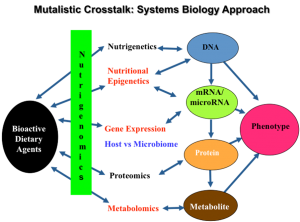We have explored the ability of plant and marine/fungal species-derived bioactive agents (limonin, curcumin, dietary fibers, n-3 polyunsaturated fatty acids) on mucosal homeostasis and the resolution of chronic inflammation in the intestine. Cell culture and transgenic animal models of acute/chronic inflammation and colon cancer have been used in a complementary manner. We have also optimized a primary somatic stem cell colonic crypt “organoid” cell culture system for the purpose of examining the effects of diet-derived chemotherapeutic agents on self-organizing epithelial structure ex vivo. These results provide a critical new paradigm in understanding the molecular mechanisms through which diet modulates, innate immune responses, T-cell activation, intestinal inflammation and colorectal cancer.
By bringing together collaborators in the fields of nutrition, microbiology, pediatrics, computational modeling and statistics, we developed novel “non-invasive” high throughput gene sequencing techniques to simultaneously examine both intestinal gene expression and microbial (microbiome) composition in stool samples. The technique involves isolating genetic material from both intestinal epithelial cells and microbes shed in the subjects’ stools, and comparing the extent to which genes are expressed in both the host and microbiome in subjects administered bioactive dietary agents. This breakthrough technology, for the first time, will provide insight into both host and microbial responses to prebiotic dietary components in human subjects. Ultimately, the integration of information from the “host” and the microbiome will be used to identify important regulatory pathways of the gut microbiome affecting intestinal development throughout the life span. The use of non-invasive stool-based tests will become critical tools in tailoring diet and practices that modulate epithelial (host) cells and microbiota to promote intestinal development and health.


